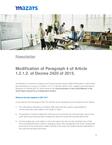
Modification of Paragraph 4 of Article 1.2.1.2. of Decree 2420 of 2015.
What are the key aspects of ISA 701?
In accordance with the scope of ISA 701 the key issues addressed by the standard are as follows:
- This International Standard on Auditing (ISA) deals with the auditor's responsibility to communicate key audit matters in the auditor's report.
- The purpose of communicating key audit issues is to enhance the communicative value of the audit report by providing greater transparency about the audit that has been performed.
- Communicating key audit matters in the audit report may also provide intended users of the financial statements with a basis for engaging further with management and those charged with governance of the entity about matters relating to the entity, the audited financial statements or the audit that has been performed.
- The communication of key audit matters in the auditor's report is made in the context of the opinion formed by the auditor on the financial statements as a whole.
- This ISA applies to audits of complete sets of general purpose financial statements of listed 1entities and in circumstances where the auditor otherwise chooses to communicate key audit matters in the auditor's report.
What is the change made in numeral 4 of Article 1.2.1.2. of Decree 2420 of 2015?
According to the previous version 4 of section 1.2.1.2 of Decree 2420, it was established that the section corresponding to the key audit issues of ISA 701 was "mandatory for Statutory Auditors and Independent Public Accountants who issue opinions on the financial statements of entities that apply, on a mandatory or voluntary basis, the Financial Reporting Standards for Group 12, and of state entities required to apply the regulatory framework for companies listed on the stock market, or that capture or manage public savings. This standard shall also apply to tax auditors or independent public accountants who issue an opinion on the financial statements of entities that the law or other legal provisions classify as of public interest".
However, with this change the article limits this obligation to communicate key audit issues only to the statutory auditors of entities issuing securities and public 3 interest entities, for other entities the statutory auditor will do so voluntarily.
The updated numeral is included below.
"4. ISA 701 shall be mandatory for independent public accountants and statutory auditors who issue opinions on audits of complete sets of general purpose financial statements of entities issuing securities that publish their financial information in the National Registry of Securities and Issuers (RNVE), as well as those considered to be of public interest, in accordance with paragraph 1, of Article 1. 1.1.1., of the Sole Regulatory Decree 2420 of 2015 and, voluntarily in circumstances in which, the auditor or statutory auditor in the other entities, decides to communicate key issues of the audit in the report of the external auditor and statutory auditor".
[1] Listed Entities: Companies listed on the stock exchange or other secondary market.
[2] The following are considered as groups for IFRS application:
Group 1: Entities that meet the following characteristics:
- Securities issuers: Entities and trust businesses that have securities registered in the National Registry of Securities and Issuers (RNVE) under the terms of Article 1.1.1.1.1.1 of Decree 2555 of 2010.
- Public interest entities and businesses.
- Entities that are not included in the previous numerals, that have a staff of more than 200 employees or with total assets exceeding 30,000 legal minimum monthly salaries in force (SMMLV) and that, additionally, comply with any of the following parameters:
- Being a subsidiary or branch of a foreign company that applies full IFRS.
- Being a subordinate or parent company of a national company that must apply full IFRS.
- Being a parent, associate or joint venture of one or more foreign entities that apply full IFRS.
- Imports or exports that represent more than 50% of purchases or sales, respectively.
Group 2: Entities that meet the following characteristics:
- Entities that do not apply Financial Reporting Standards for Group 1 entities, nor do they apply Financial Reporting Standards for Group 3 entities.
- Entities that meet the requirements to belong to Group 3 and have decided to voluntarily apply the Financial Reporting Standards for Group 2 entities.
- Third party portfolios managed by brokerage firms, trust businesses and any other special purpose vehicle, managed by entities supervised by the Financial Superintendency of Colombia, that do not contractually establish the application of the technical regulatory frameworks in force for Group 1, nor are of public interest, and whose main purpose of the contract is to obtain results in the execution of the business, which implies self-management of the entity and, therefore, a residual interest in the net assets of the business by the trustor and/or client.
3 Public Interest Entities: Entities that, with prior authorization from the competent state authority, capture, handle or administer resources from the public".



